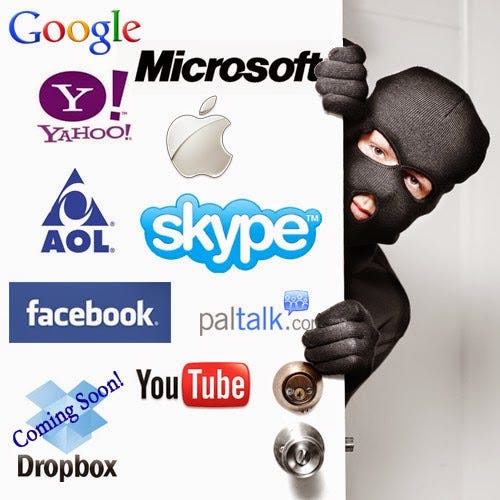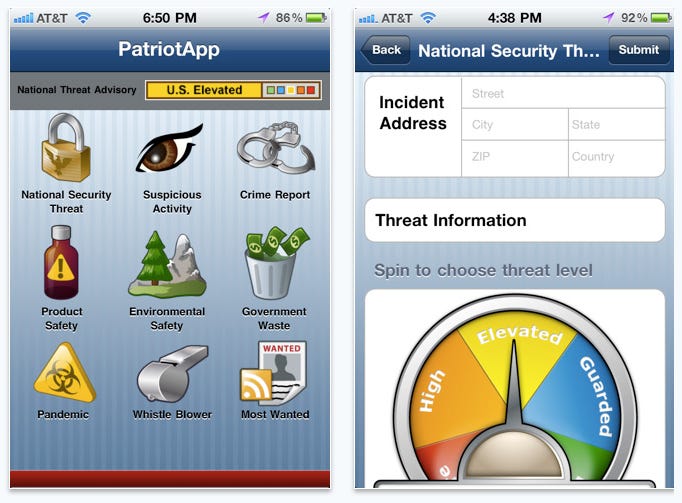Police, corporate & citizen spying, welcome to the new Amerika

Plenty of people use Pinterest to find things — purses, posh hotels, eggplant parm recipes — but the rightful owner of a charm bracelet stolen 30 years ago? Leave that to the police.
In February, when an officer in Redwood City, Calif., discovered bags of stolen jewelry in the trunk of a car during a routine traffic stop, Detective Dave Stahler turned to social media — in hopes of tracking down the owner of a charm bracelet stamped with names and dates.
Eight hours after posting on his department's Facebook, Twitter — and the Pinterest page the agency launched in February — Stahler received information from not one but three people who helped identify the owner of the bracelet. That alone would be a good story — but when you learn that the jewelry was actually a mother's keepsake engraved with the names and birth dates of her children and stolen during a residential burglary in 1983, well, it's sweeter than all the red velvet cupcake recipes on Pinterest combined.
This is the fourth person in the area to be reunited with their property via Pinterest, according to an alert praising the "instrumental" role social media now play in the Redwood City Police Department, posted on Nixle, an online platform that connects the public with local government and law enforcement agencies.
The International Association of Chiefs of Police Center for Social Media found that 92 percent of U.S. law enforcement agencies use Facebook — but adoption of other platforms not so much. Apparently, more report using MySpace (um, what?) than Pinterest or Instagram, according to the study conducted last fall.
And while cops using social media to communicate is not new, there are signs that the practice is becoming more common, experimental — and effective. Exactly how effective is, for now, difficult to say. While far fewer police use Pinterest to solve crimes compared with Facebook or Twitter, and comprehensive statistics on its use for this purpose are scarce, law enforcement agencies around the country have reported successfully using it in the past year.
A quick search on Pinterest shows about 85 boards from police departments around the country — including Kansas City, Mo., police — who have used Pinterest to help solve burglary and robbery cases, locate missing people and educate parents about street drugs their kids may be using.
Expanding beyond Facebook and Twitter makes sense, especially when you consider that Pinterest's user base is cited as 80 percent female — and made up of people more used to getting their news in a digital landscape than, say, on the evening news.
And it's not just Pinterest — YouTube, too. With the Missing Person Pre-Roll project, the Australian Federal Police teamed up with YouTube to turn the annoying, unavoidable "pre-roll" (shown before the video you actually want to see) into the first scrolling missing-persons campaign. It reached 1.2 million people, resulted in 238 viewers clicking "Yes, I have," and won an activism award at this year's South by Southwest Interactive. Beats the old 1980s back of the milk carton.
From Georgia to Pennsylvania, police are hosting "tweet-alongs" that allow citizens to follow them on the job via their Twitter accounts. And this June, says Stevens, the third 24-hour Global Police Tweet-a-Thon aims to top the 31,000 tweets and 19 million people reached during its last event, in November.
http://www.npr.org/blogs/alltechconsidered/2014/05/05/309058202/you-love-pinterest-find-out-why-the-police-do-too
Sherriff admits Big Brother is here but wanted it kept secret:
In a secret test of mass surveillance technology, the Los Angeles County Sheriff's Department sent a civilian aircraft over Compton, California, capturing high-resolution video of everything that happened inside that 10-square-mile municipality.
Compton residents weren't told about the spying, which happened in 2012. "We literally watched all of Compton during the times that we were flying, so we could zoom in anywhere within the city of Compton and follow cars and see people," Ross McNutt of Persistence Surveillance Systems told the Center for Investigative Reporting, which unearthed and did the first reporting on this important story.
The spy technology he's trying to sell to police departments all over America can stay aloft for up to six hours. Like Google Earth, it enables police to zoom in on certain areas. And like TiVo, it permits them to rewind, so that they can look back and see what happened anywhere they weren't watching in real time.
If it's adopted (when its adopted), Americans can be policed like Iraqis and Afghanis under occupation–and at bargain prices:
McNutt, who holds a doctorate in rapid product development, helped build wide-area surveillance to hunt down bombing suspects in Iraq and Afghanistan. He decided that clusters of high-powered surveillance cameras attached to the belly of small civilian aircraft could be a game-changer in U.S. law enforcement.
“Our whole system costs less than the price of a single police helicopter and costs less for an hour to operate than a police helicopter,” McNutt said. “But at the same time, it watches 10,000 times the area that a police helicopter could watch.”
Sgt. Douglas Iketani acknowledges that his agency hid the experiment to avoid public opposition. "This system was kind of kept confidential from everybody in the public,"he said. "A lot of people do have a problem with the eye in the sky, the Big Brother, so to mitigate those kinds of complaints we basically kept it pretty hush hush." That attitude ought to get a public employee summarily terminated.
"Our first initial thought was, oh, Big Brother, we're going to have a camera flying over us. But with the wide area surveillance you would have the ability to solve a lot of the unsolvable crimes with no witnesses, no videotape surveillance, no fingerprints."
He later explains that while the public may think its against this, we'll get used to it:
I'm sure that once people find out this experiment went on they might be a little upset. But knowing that we can't see into their bedroom windows, we can't see into their pools, we can't see into their showers. You know, I'm sure they'll be okay with it. With the amount of technology out in today's age, with cameras in ATMs, at every 7/11, at every supermarket, pretty much every light poll, all the license plate cameras, the red light cameras, people have just gotten used to being watched.
We will not get used to it and we'd better stand up and tell DHS/NSA and our complicit police we're done being spied upon, PERIOD!
Police are using a new crowdsourcing app that encourages citizens & students to spy on Americans.
LEEDIR, the Large Emergency Event Digital Information Repository, helps police use smartphones as tools to gather evidence.

"LEEDIR is an eyewitness photo and video platform that can be activated for FREE by law enforcement and relief agencies during a major emergency event. Immediately after activation, the LEEDIR iPhone app, Android app and website are available to receive uploads from citizens."
Privacy advocates criticize the app as overly broad, saying it subjects innocent people to police scrutiny and probably won't produce much good evidence. "There's a reason that we pay professionals to work in police departments," said Nate Cardozo, a civil liberties attorney with the Electronic Frontier Foundation.
"And there's a reason we don't crowdsource photo lineups and the like — crowds aren't good at it," he said.
Culver City, California-based tech startup CitizenGlobal Inc. and Amazon Web Services to design the system as a public-private partnership offered free to authorities and members of the public.
Another citizen spying program which private corporations funded and are profiting from.
CitizenGlobal officials predict use will grow. The company designs crowdsourcing platforms for police, cities and schools, using Amazon Web Services as its backend, and LEEDIR helps showcase their work. Already, officials say, police agencies around the nation have shown interest in embracing technology.
You read that right, students are being conditioned to spy on teachers, classmates etc, where does it end?
Excerpt from Citizen Global's website: "Empower citizens to submit photos and videos with GPS data from mobile or web of crime scenes, emergency situations or public infrastructure issues."
Dictatorships know how difficult it is to rule over large populations with only the relatively small numbers of military and police. Despite the lessons of terror created by citizen surveillance that the East German Stasi files left us to examine, just such a network has been openly introduced to present-day America -- and now it's even more high-tech and populated.
Secret black budget projects organized through the NSA like Perfect Citizen is just one among many. Our former head of Homeland Security, Janet Napolitano -- in partnership with retailer Wal-Mart -- kicked off the See Something, Say Something program, which goes beyond the already high-tech surveillance apparatus of the NSA and turns each of us into an unpaid employee of the police state.
We can now download appswhich enable citizens to spy on your annoying neighbor etc.
DHS's program provides immunity for accusers "acting in good faith" while reporting suspicious activities. This is guaranteed to lead to false arrests and disappearances, just as it has on every occasion throughout history when a society's fear becomes self-directed.
"Unfortunately, the courts and the police have meshed in their thinking to such an extent that anything goes when it’s done in the name of national security, crime fighting and terrorism. Consequently, America no longer operates under a system of justice characterized by due process, an assumption of innocence, probable cause and clear prohibitions on government overreach and police abuse. Instead, our courts of justice have been transformed into courts of order, advocating for the government’s interests, rather than championing the rights of the citizenry, as enshrined in the Constitution.
The U.S. Constitution, once the map by which we navigated sometimes hostile terrain, has been unceremoniously booted out of the runaway car that is our government, driven over and left for road kill on the side of the road. All that can be seen in the rear view mirror are the tire marks on its ragged frame" said John Whitehead.
http://www.theatlantic.com/national/archive/2014/04/sheriffs-deputy-compares-drone-surveillance-of-compton-to-big-brother/360954/
Microsoft is changing urban centers into global spying cities:
Microsoft Corporation will be “opening a state-of-the-art training facility” in Miami, Florida to add to the already operational “innovation centers” across the globe in 80 countries.
This is part of the Microsoft CityNext Initiative (MCNI) which is purposed with accelerating urban development, harnessing innovative concepts and using community leaders to push sustainable living.
Laughable if it weren't so telling. Microsoft openly admits to influencing politicians to expand its corporate (NSA) spying agenda!
Sanket Akerkar, vice president at Microsoft, told media that “Miami is a great destination in and of itself. We’ve got forward thinking government leaders.”
This scheme is an attempt to “bring the world to Miami” with public-private partnerships (PPPs) and regional entrepreneurs in the tech field.
Akerkar suggests that an “app economy” could assist students in designing their own apps.
This facility will meld governments, academia, community leaders, and start-ups to learn how to “better use technology to innovate and develop more collaborative learning” in the name of economic development.
Investors, start-ups and multi-national corporations will be attending the eMerge Americas Techweek conference (EMAT) in Miami to promote Microsoft’s plans to use sites in the US for regional tech hubs.
The MCNI is moving toward building the Smart Cities that are being constructed in already existing urbanized centers.
Corporations (Microsoft/NSA) will have control over everything!
MCNI will gain control and oversight over:
• Energy
• Water
• Infrastructure
• Transportation
• Public Safety
• Tourism
• Recreation
• Education
• Health and Social services
• Government administrations
http://www.occupycorporatism.com/home/microsoft-changing-urban-centers-global-smart-cities/



